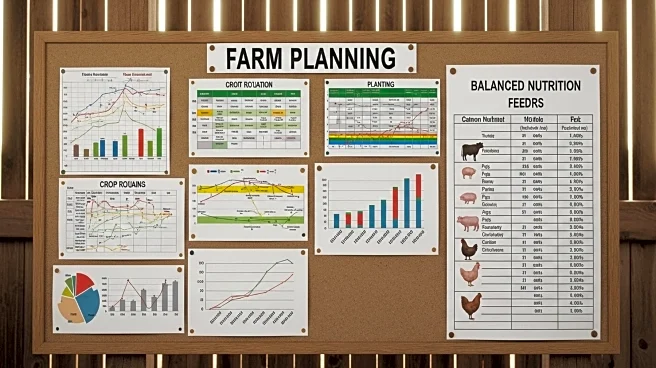What is the story about?
What's Happening?
At the recent Wagyu Conference in Frankfurt, experts Jan-Hendrik Zietsman and Waldo Scheepers shared insights on successful beef farming, emphasizing the importance of planning and nutrition. Zietsman highlighted that meticulous planning is crucial, citing a sheep farmer's improved conception rates due to thorough preparation. He stressed that planning should focus on nutrition, as undernutrition is a leading cause of poor fertility. Scheepers discussed the need to understand market demands before breeding, advising farmers to breed with their market in mind. Both experts underscored the importance of balancing traits such as growth, fertility, and adaptability in livestock. Additionally, Zietsman recommended building a colostrum bank to ensure calves receive necessary antibodies shortly after birth.
Why It's Important?
The insights from the Wagyu Conference are significant for U.S. livestock farmers seeking to enhance productivity and profitability. Effective planning and nutrition management can lead to improved fertility rates and overall herd health, which are critical for sustaining competitive operations. Understanding market demands allows farmers to tailor their breeding strategies, potentially increasing sales and customer satisfaction. The emphasis on balancing traits ensures that livestock are well-suited to their environments, reducing the risk of operational inefficiencies. These practices can help U.S. farmers navigate challenges such as fluctuating market prices and rising production costs, ultimately contributing to a more resilient agricultural sector.
What's Next?
Farmers may consider implementing the strategies discussed at the conference, such as creating detailed annual plans and consulting with veterinarians to design tailored vaccination programs. Building a colostrum bank and focusing on nutritional priorities during critical phases like late pregnancy could become standard practices. As farmers adopt these methods, they might see improved herd health and productivity, leading to increased profitability. Additionally, the emphasis on mentorship suggests that farmers could benefit from seeking guidance from experienced peers, potentially accelerating their learning curve and enhancing their operations.
Beyond the Headlines
The conference highlights the ethical dimension of livestock farming, where animal welfare is closely tied to planning and nutrition. Ensuring calves receive adequate colostrum and maintaining balanced traits in livestock can lead to healthier animals and more humane farming practices. The focus on planning and market understanding also reflects a shift towards more strategic and informed farming, which could drive long-term sustainability in the industry. As farmers adopt these practices, they may contribute to a broader cultural shift towards responsible and efficient agricultural methods.
















